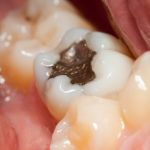 The average adult in the U.S. has seven dental fillings. While dental fillings are a necessary solutions to the problem of tooth decay, they are not without problems. Although fillings can last a lifetime with proper care, they often need replacing after several years or decades. Here are a few of the reasons why fillings fail, and some advice for preventing this problem.
The average adult in the U.S. has seven dental fillings. While dental fillings are a necessary solutions to the problem of tooth decay, they are not without problems. Although fillings can last a lifetime with proper care, they often need replacing after several years or decades. Here are a few of the reasons why fillings fail, and some advice for preventing this problem.
Dental Fillings Lifespan
The lifespan of a dental filling depends on several factors. Fillings that replace a large amount of tooth tissue are more likely to need to be replaced with a crown at some point in the future. If you have a tooth that requires a very large filling, your dentist might recommend that you have a crown placed now to avoid the possibility of needing further treatment in the future.
How your lifestyle effects your dental fillings
Lifestyle factors also play a role in the lifespan of dental fillings. If you want your fillings to last, then you will need to stick to a healthy oral hygiene routine, which includes brushing your teeth thoroughly each morning and evening, flossing between teeth, and seeing your dentist regularly for check-ups.
Why did my dental filling fall out?
Fillings are often lost when biting down on a particularly chewy piece of food, but another common way that a filling can fail is that the tooth holding the filling can crack and break into pieces. The risk of cracking is greater for fillings that are made of dental amalgam – the silver material traditionally used to fill teeth – because this material expands and contracts with fluctuations in temperature. Over time, this slight movement can cause cracks to develop in the teeth.
Problems with Dental Fillings
Dental fillings provide an effective solution to the problem of tooth decay, which can spread quickly if teeth are left unfilled. However, some dental experts fear that certain types of fillings could harm patients. Dental amalgam is made from mercury, which is highly poisonous. Some studies have shown that there is a risk of mercury gradually leaking out of the filling and into the patient’s body.
A safer alternative to dental amalgam
A safer alternative to dental amalgam is resin composite, which is a type of reinforced plastic. As well as being non-toxic, composite fillings also preserve the structure of the tooth more effectively than amalgam fillings, so the tooth is less likely to crack.
If you have concerns about your dental fillings, see your dentist as soon as possible. Rapid treatment may be necessary to prevent further decay or damage occurring.


